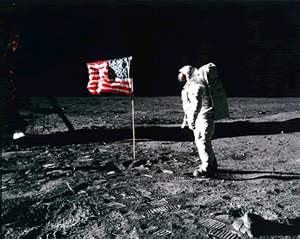Up on the Moon
Listen to the Recess! Clip
| Author | Kevin Shortsleeve |
| Air Date | 7/20/2004 |

Up on the Moon Transcript
I have always felt lucky to remember the first moon landing. At the time, I was only three and a half. I suppose that if I had been born just a few months later, I could have missed the event entirely. It is my earliest memory.
It may have been the excitement of my older siblings that left me with such a strong impression. I remember riding in the back seat of our big old station wagon. We’d been on vacation – and now were rushing home to catch the events about to unfold on live television. Someone pointed out the window of the car. The moon was bright behind the branches that whizzed by. My older brothers joked about getting a flat-tire or running out of gas.
Just before the broadcast, my father took me by the hand. He wanted to be certain I understood what was happening. He took me out on the front steps of our house and pointed to the Moon. He told me men from the United States had landed there and that it was the first time anyone had ever been there.
Over the next three and a half years, the Apollo missions continued. In all, twelve men walked on the moon. As a growing boy, I watched in fascination. I remember worrying for the astronauts — that they would be cold or that they wouldn’t know the way back because space was so dark. I remember praying during those harrowing moments of re-entry.
Events such as these have no small effect on the young mind. The Apollo astronauts were heroes of the highest degree, and made millions of children want to become astronauts. But there was more to the heroics of the story than the sheer daring of those men. There were the other, no less compelling facts that some three hundred thousand people worked for eight years, and built a six million pound vehicle comprised of three million working parts – that this vehicle traveled at 25,000 miles per hour and safely carried men to the moon – and back – so that, as then President Nixon commented, “The heavens have become a part of man’s world.”
The magnitude of that endeavor, with its clear intent to achieve the impossible – left an indelible mark on the outlook of many young people all over the world. As President Kennedy said, “We choose to go to the moon, not because it is easy, but because it is hard.” We should look back and remember those missions with children today, so that they can see what it is truly possible to achieve, if we work together.
Sources:
Apollo 11, NASA Space Series, International Video Corporation, 1997
Moonwalkers, NASA Space Series, International Video Corporation, 1997